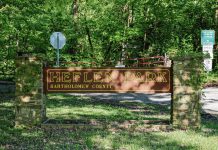An Indianapolis engineering firm is taking its first steps toward turning Columbus’ Riverwalk vision into reality by beginning an initial study of the land in question and developing a one-year timeline for the project’s progress.
CORE Planning, the firm hired by the Columbus Redevelopment Commission to act as the Riverwalk project manager, has created a timeline that calls for its staff to immediately begin a preliminary site investigation on the land between the Second and Third Street bridges, said Karen Valiquett, the CORE Riverwalk project manager.
That portion of the riverfront has been identified as an area that could be cleaned up and potentially used to expand Columbus’ trail system.
The timeline spans the spring of 2016 through the spring of 2017, when a conceptual design is scheduled to be created, Valiquett said.
The commission hired CORE for a maximum of $90,000 for 50 weeks of work to assess the land between the bridges holistically — including the existing dam and the former landfill along the south side of the river — to determine how it could be improved for public use.
The preliminary investigation also will encompass a larger portion of land surrounding the designated area between the bridges to determine how any changes would impact other portions of the riverbank, said Deb Kunce, CORE owner.
The investigation will look at the former landfill to determine what restrictions are in place for development of the contaminated area, an Army Corps of Engineers study of the wetlands, a historical study of the land, particularly the dam, and an archeological study.
The findings of the preliminary site investigation likely will be ready in August or September, Kunce said.
CORE plans to provide quarterly updates to the redevelopment commission, but will also work directly with a community advisory committee to keep the city apprised of the Riverwalk project’s progress, Kunce said.
Several Columbus organizations will be represented on the committee, Kunce said, including citizens, the Columbus Park Foundation, the Columbus Area Arts Council, the city engineering office and the Columbus Economic Development Board, among others.
Redevelopment director Heather Pope will reach out to those organizations to find committee members, Kunce said.
CORE’s plans for the city’s riverfront come after members of the Columbus City Council sidestepped former Mayor Kristen Brown’s version of the Riverwalk project last summer.
Brown’s plan had included spending $2.5 million to construct a concrete bridge to connect parts of the downtown People Trails over the river.
Although the redevelopment commission at that time sent a favorable, though split, recommendation for Brown’s project to the council, council members — including then councilman Jim Lienhoop — ultimately chose not to vote on Brown’s proposal, which effectively killed the measure for the time being. Council members said they wanted to examine other options for the riverfront besides building the People Trails connection.
When the project was resumed under Lienhoop’s administration in February, the mayor said he was in favor of a holistic approach to the riverfront revitalization.
[sc:pullout-title pullout-title=”Riverfront project timeline” ][sc:pullout-text-begin]
As project manager, CORE Planning Strategies will be asked to examine the downtown area between the Second and Third Street bridges to determine what improvements could be made.
Improvements could include finding a way to connect the existing People Trails in the riverfront area, repairing or replacing the dam and cleaning up trees and debris from a nearby former landfill.
The city will have to work with the Department of Natural Resources, the Army Corp. of Engineers and other governmental agencies throughout the Riverwalk project.
CORE’s initial timeline for the Riverwalk project is:
- Spring and summer 2016: Preliminary site investigation
- Fall and winter of 2016: Project requirements and scope development
- Winter 2016: Designer selection
- Spring 2017: Conceptual design development and preliminary permitting
[sc:pullout-text-end]




